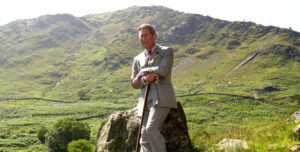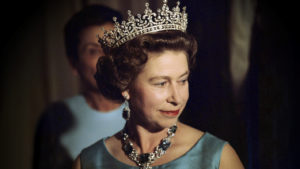God Save The King. The announcement yesterday that King Charles is receiving treatment for cancer has sent another tremor through a Britain that feels frailer by the day.
And yet, this reminder of our King’s frailty, at 75, also stands for a broader transformation now afoot: the Boomerdämmerung, or twilight of the Baby Boomers. In old Norse mythology “Ragnarok”, translated by the German composer Richard Wagner as Götterdammerung, or “Twilight of the Gods”, is a time of cruel weather, moral chaos, and monsters rising from all points of the compass. Mountains will fall, the seas will rise, and the world-serpent will come ashore, as the gods clash in one final, world-ending battle.
But there is hope. This fateful time, for ancient Germanic legend, is a period both of terrible destruction and also of renewal: the Götterdammerung may see Valhalla aflame, but in its aftermath the world will be rebuilt anew.
Wagner used this motif as a backdrop for the final opera in his four-part Ring Cycle, an adaptation of an old Germanic myth first performed in 1876. It premiered just a few years after the fateful 1871 union of Germany: a transformation that tipped the first geopolitical domino that would culminate in the cataclysm of two World Wars.
Living through the era from the Ring Cycle to Yalta must have felt itself like a kind of Götterdammerung. Certainly, the first generation born after its 1945 resolution were determined to build a wholly new world, amid the ruins of the old. A demographic bulge group, conceived and born amid the relief, reunion, and rebuilding that consumed Europe after the two wars, the Boomers threw out the old sexual codes, dismissed pre-war European culture as stuffy and “square”, and scorned anything that smacked of nationalism, patriotism, or old high European culture as dangerously Hitlerish. In place of all that, they dreamed of new, sunlit Valhallas, freed from the dark gods of industrialised wartime destruction.
The culture they bequeathed us — what today is denounced as the “Boomer Truth Regime” — worshipped transformation, freedom, youth, and the future. Tradition and heritage was a drag. We were all on a path toward ever more individual self-realisation. But it was two-edged.
In her 2021 book Boomers, Helen Andrews argues that in each case, this generation – from Steve Jobs to Camille Paglia and Aaron Sorkin – set out to liberate us, but “what they passed on to their children was worse than what they inherited”.
Jobs sought to free our inner rebels, but created instead the stultifying world of social media; Al Sharpton turned social justice into a shakedown geared toward making well-off liberals feel good about their opinions; Paglia profited from an academic rigour whose abandonment she helped to legitimise.
These arguments will be familiar to anyone of my age and younger, who looks askance at the generation that benefited from free university education and affordable housing, and has since presided over an era in which both have become something more like Ponzi schemes. Today the university system the boomers bequeathed us is a monolithically Left-wing and increasingly academically flaccid visa factory; housing, meanwhile, is a piggy-bank for those that have and a pipe-dream for the rest.
But the consternation that has greeted news of King Charles’ ailing health should remind us that not all boomers are created alike, or indeed all boomerism. It’s easy to dismiss this generation, with its optimism and sheer good fortune, as one characterised principally by the self-absorption and wanton destructiveness Andrews skewers in the figures she profiles. But even leaving aside the fact that the boomers are all our parents and grandparents, I don’t greet our approaching Boomerdämmerung with glee.
Andrews can say, with some justice, that many boomers have not just failed to preserve and pass on the legacy they received to their own progeny, but actively consumed that cultural and economic seed-corn for their own selfish pleasure. “Spending the kids’ inheritance” is so common and celebrated among boomers it even commands an acronym (“SKI-ing”), how-to books and celebratory articles.
But there are boomers and boomers. Much of the social fabric in my small town is held together by boomers. They show up to church. They donate their time to committees, volunteer for the council, make cakes for coffee mornings, and pick up litter. Small-town boomers are unfailingly polite, kind, generous, and public-spirited. In keeping with this spirit, boomers volunteer at much higher rates than younger generations: over 50% of those aged 65-74 do so at least once a year.
Nor is this the only store of cultural capital that threatens to expire with the boomers. As murmurs of concern grow louder over a supposed competence crisis — whether or not this is driven by “diversity” hiring practices — they are now exiting the workforce at accelerating rates. It appears, too, that they are often doing so without passing on their skills to younger generations.
What will life be like once they’re gone? In the 1988 comedy Funny Farm, the character Mickey says dismissively of an unstable river crossing: “That ain’t a bridge. It’s termites holding hands”. That is: burrowing insects have hollowed out a once-sturdy piece of woodwork, and are maintaining its semblance only by clinging to one another, meaning the slightest hint of pressure will cause that solid-seeming form to collapse into powder.
And the Boomer Truth Regime is now taking on a similar character. Something once unshakeable is now so fragile that — for better or worse — it’s only the tenacity of the very creatures that caused that fragility which still holds it together. The world’s only superpower, for example, the regime surely most closely identified alike with boomer self-discovery and boomer post-nationalism, faces a Presidential election this year. And both front-runners are boomers: men older than King Charles, and yet clinging to power with every ounce of their remaining vigour.
What they’re now preserving is, ironically, a regime implacably hostile to the idea of preservation. The Boomers scorned the prewar order of patriotism and tradition. They gave us a regime of unlimited self-expression, post-national governance, and individual freedom. And it was all mythologised via the narrative of Good vs Evil that grew up around the Second World War. But as the boomers’ grip on power begins to falter in earnest, so we’re witnessing a steadily accelerating re-evaluation of the Boomer Truth Regime origin-story, the Ragnarok of that war.
As the wolf Fenrir shakes off his chains, and the mountains and oceans of Boomer Truth begin to shudder and boil, this re-evaluation of our past will also grow more febrile. Even those of us who chafe under Boomer Truth may not like the form this takes. One central pillar of that truth regime, for example, has always been a definition of the good relative to absolute evil as epitomised by Hitler and the Nazis, with the Holocaust as its central exhibit. But today, one in five young Americans thinks the Holocaust is a myth. That proportion among boomers, by contrast, is close to zero. The same stark generational shift can be seen in the rising proportion of young people who support a strongman leader.
Only a fool or ghoul would try and speculate on how our political landscape will evolve once the boomers are gone. But I suspect we’ll miss them bitterly: for though some aspects of boomerism undermined their own postwar settlement, boomers are also now the main force holding that settlement together.
King Charles surely epitomises this dual aspect of boomerism. A staunch Traditionalist and admirer of the anti-modern thinker René Guénon, he is criticised by some for being too backward-looking — while also (for example in his expressed wish to serve as “defender of all faiths”) standing accused by others of destructive progressivism and betraying the Church of England. Most likely though, as with boomers in the aggregate, he’s both: classically boomerish in his simultaneous ironclad confidence in the persistence of tradition, and certainty that traditions can and should be remixed at will in the name of progress.
Subsequent generations understand more clearly that this faith is often misplaced. Skills may be lost in generational transition, cultural reserves may be exhausted, carefully-accumulated inheritances may be frittered (literally) on cruises or (figuratively) on self-discovery and “modernisation”. But the true extent of the loss will, most likely, only become apparent as the ineluctable Boomerdämmerung approaches.
I wish King Charles a speedy recovery and a long reign yet. But in the end, as the Old Norse seeress reminds us, not even the gods can escape the cycle of death and rebirth. The growing frailty of the boomers feels like a chill wind of mortality, blowing around my own middle-aged vitals. But it blows an even more chilly wind of mortality around the world the boomers created, and whose increasingly brittle form is now fracturing at an accelerating pace.
Disclaimer
Some of the posts we share are controversial and we do not necessarily agree with them in the whole extend. Sometimes we agree with the content or part of it but we do not agree with the narration or language. Nevertheless we find them somehow interesting, valuable and/or informative or we share them, because we strongly believe in freedom of speech, free press and journalism. We strongly encourage you to have a critical approach to all the content, do your own research and analysis to build your own opinion.
We would be glad to have your feedback.
Source: UnHerd Read the original article here: https://unherd.com/




